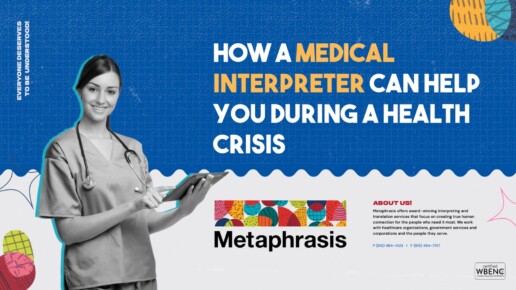How a Medical Interpreter Can Help You During a Health Crisis
In times of health crises, effective communication becomes a lifeline. For patients with limited proficiency in the primary language of their healthcare provider, the role of a medical interpreter is indispensable. Miscommunication in medical settings can lead to delays, misdiagnoses, or improper treatments. Here’s an in-depth look at how medical interpreters can make a critical difference during health emergencies and why their services, like those offered by Metaphrasis, are essential for inclusive and accurate healthcare.
What Is a Medical Interpreter?
A medical interpreter bridges the language gap between patients and healthcare providers. Their role goes beyond simple translation; they ensure that cultural nuances, medical terminology, and patient emotions are accurately conveyed.
Key Responsibilities of a Medical Interpreter
- Facilitating Clear Communication: Ensures patients understand diagnoses, treatments, and medical procedures.
- Maintaining Confidentiality: Follows strict guidelines to protect patient privacy.
- Cultural Mediation: Helps mitigate misunderstandings rooted in cultural differences.
Why Medical Interpreters Are Crucial in Health Crises
During a health crisis, every second counts. Accurate communication is not just helpful—it can be a matter of life and death. Here’s why medical interpreters are vital:
- Eliminating Language Barriers
Patients who don’t speak the same language as their healthcare provider often feel isolated and anxious. Medical interpreters step in to:
- Clarify complex medical terminology.
- Translate patient concerns accurately to the doctor.
- Provide a comforting presence by ensuring patients are understood.
- Enhancing Patient Safety
Miscommunication can lead to errors in medication or treatment plans. Interpreters help by:
- Ensuring accurate instructions are communicated.
- Preventing adverse drug reactions through detailed explanations of prescriptions.
- Allowing patients to make informed decisions about their care.
- Addressing Cultural Differences
Cultural beliefs can significantly impact how patients perceive medical interventions. Medical interpreters:
- Navigate these cultural complexities.
- Educate healthcare professionals about a patient’s cultural preferences.
- Build trust between providers and patients.
The Role of Medical Interpreters in Emergency Situations
In emergencies, time is limited, and the stakes are high. Medical interpreters excel in these scenarios by acting as a critical link.
Rapid Diagnosis and Treatment
An interpreter can relay symptoms, allergies, and medical history quickly, ensuring healthcare providers can act promptly.
Supporting Emotional Well-being
Health crises are emotionally taxing. By ensuring patients understand what’s happening, interpreters alleviate some of the stress and fear.
Navigating Legal and Ethical Obligations
Informed consent is a cornerstone of medical ethics. Interpreters help patients understand consent forms, legal documents, and their rights in the healthcare system.
How Metaphrasis Makes a Difference
Metaphrasis stands out as a leader in providing professional medical interpretation services. Their interpreters are highly trained, culturally competent, and adhere to the highest standards of accuracy and confidentiality.
What Sets Metaphrasis Apart
- Expert Training: Their interpreters undergo rigorous medical training.
- Availability: Services are accessible 24/7, a critical feature during health crises.
- Cultural Sensitivity: Metaphrasis prioritizes cultural competence in all interactions.
How to Access Medical Interpretation Services
For patients or families in need of interpretation services, the process is straightforward:
- Ask Your Healthcare Provider
Most hospitals and clinics are partnered with professional interpretation services like Metaphrasis. Request an interpreter when scheduling your appointment or during your visit.
- Leverage Remote Interpretation
Telehealth services have made remote interpretation widely accessible. Through video or phone calls, interpreters can assist patients in real time.
- Advocate for Your Needs
If interpretation services aren’t offered, patients have the right to request them. Under laws like Title VI of the Civil Rights Act, healthcare providers must ensure language access.
Benefits of Using Professional Medical Interpreters
While family members or friends may offer to interpret, relying on professionals is always the safer choice. Here’s why:
Accuracy
Medical interpreters are trained in medical terminology, ensuring precise communication.
Neutrality
Professionals maintain objectivity, whereas family members might filter information based on emotions.
Confidentiality
Professional interpreters adhere to strict ethical standards to protect patient privacy.
The Future of Medical Interpretation
With technological advancements, medical interpretation is evolving. Tools like AI-powered language software and remote interpretation platforms are making services more efficient and accessible. However, the human element remains irreplaceable—empathy and cultural understanding are qualities no machine can replicate.
Conclusion
During a health crisis, a medical interpreter can be your strongest ally. They ensure clear, accurate communication, enhance patient safety, and foster trust between patients and healthcare providers. Metaphrasis is a shining example of how professional interpretation services can make a life-changing difference. Remember, healthcare is a universal right, and language should never be a barrier to receiving it.

